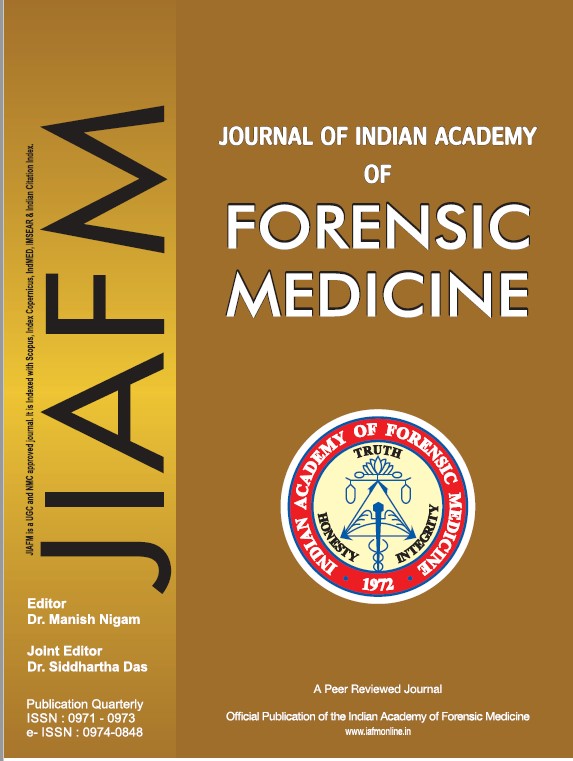Multiple Intussusceptions as the Cause of Death in Asymptomatic neonate: A rare case report
DOI:
https://doi.org/10.48165/jiafm.2024.46.1(Suppl).16Keywords:
Sudden death, Infant, IntussusceptionAbstract
Intussusception, a major cause of intestinal obstruction in childhood. The most common type is ileocolic, followed by ileo-ileal. Intussusception has a peak incidence between three to nine months (Pollack and Pender, 1991) and has a male predominance. Autopsy proof of both intussusception and peritonitis is needed for pronouncement of death from aggravated intussusception. Frequent vomiting, secondary to ileus, may lead to aspiration and suffocation when it may be impossible to demonstrate peritonitis, even with confirmed intussusception. If no pathological lead point, intussusception is likely to represent a primary rather than secondary phenomenon. The cause of intussusception is not known in most of the cases. Several association and possible causative factors have been identified like large peyer's patches, polyps, Meckel diverticula, cystic fibrosis, lymphoma, viral etiology particularly adenovirus, recent history of upper respiratory illness and heredity. It is important to clearly distinguish agonal intussusception from antemortem intussusception. Agonal intussusceptions are believed to occur terminally are an incidental finding, not a cause of death although designation of the intussusception as 'agonal' cannot be justified by some authors. We report a case of a 7 days old male child with history of not accepting feed for 1 day who was brought dead. Five ileo-ileal intussusceptions were evident grossly at autopsy and histopathological examination was diagnostic of cause of death. Multiple antemortem intussusception as cause of death is fairly uncommon and no ample literature was available for reference and hence reporting the interesting case.
Downloads
References
Vinay K, Abul KAand Jon C. Aster. 2017. Robbins Basic th Pathology. 10 ed. Robbins Pathology. Philadelphia, PA: Elsevier - Health Sciences Division.
Cox DE. Intussusception: agonal phenomenon or cause of death? Med Sci Law. 1997 Oct;37(4):355-8. doi: 10.1177/ 002580249703700414. PMID: 9383948.
Ng'walali PM, Yonemitsu K, Tsunenari S. Fatal intussusception in infancy: an experience in forensic autopsy. Leg Med (Tokyo). 2003 Sep;5(3):181-4. doi: 10.1016/s1344- 6223(03)00056-7. PMID: 14568780.
Hait E. Intussusception in children. http://www.emedicine. com / emerg/topic385/htm
Hirotaro Iwase a, Hisako Motani et al. Two infant deathslinked to intussusception without peritonitis. LegalMedicine. 2010. 12; 151-153.


